
The following photo essay is an abridged excerpt from the Collective Wisdom field study with a key partner, Detroit Narrative Agency.
Since Detroit’s emergence from bankruptcy in 2014, we see a new strand of stories about Detroit, particularly stories of resurgence led by white billionaires, scrappy entrepreneurs, and pioneering artists portrayed as saviors. Black and Brown Detroiters have been excluded from the table when it comes to narratives around the city’s so-called rebirth. Yet Detroit was saving itself all along and pushing back against marginalization and erasure.
Detroit Narrative Agency (DNA) is amplifying that Detroit by incubating quality and compelling films and media that shift the dominant narratives about this city towards liberation and justice. DNA’s inaugural fellowship program supported a cohort of Black and Brown filmmakers in Detroit to develop short films and accompanying community impact strategies. DNA co-creates media from within communities, and the co-creation happens in multiple layers, in concentric circles. The process starts with deep listening.
This collection of photographs was taken by Kashira Dowridge during two DNA/MIT workshops held at the Boggs Center, home of the legendary Detroit activists and writers Jimmy Boggs and Grace Lee Boggs.
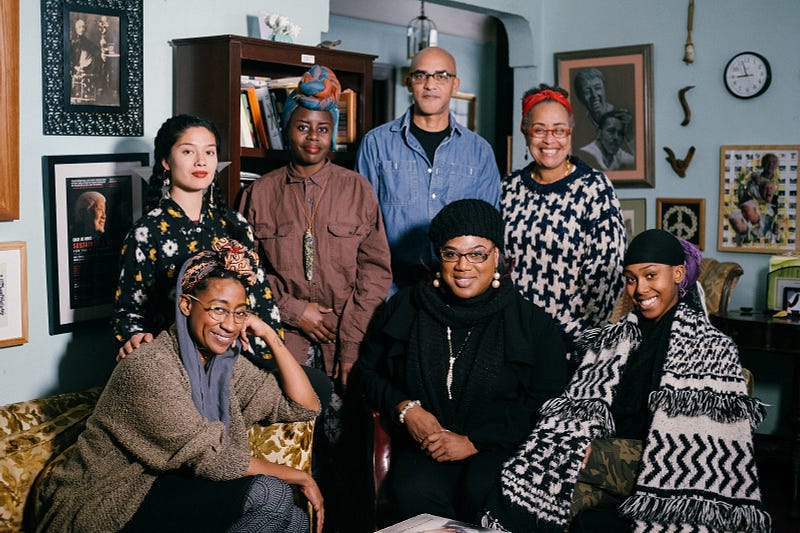 DNA’s cohort — Top row: Natasha
Tamate Weiss and Atieno Nyar Kasagam (Sidelots), Orlando Ford (Take Me Home), Alicia Diaz
(Dangerous Times: Rebellious Responses). Bottom row: Bree Gant (Riding with Aunt D. Dot), Cierra
Burks and Ahya Simone (Femme Queen Chronicles). Photo © Kashira Dowridge
DNA’s cohort — Top row: Natasha
Tamate Weiss and Atieno Nyar Kasagam (Sidelots), Orlando Ford (Take Me Home), Alicia Diaz
(Dangerous Times: Rebellious Responses). Bottom row: Bree Gant (Riding with Aunt D. Dot), Cierra
Burks and Ahya Simone (Femme Queen Chronicles). Photo © Kashira DowridgeDetroit Narrative Agency’s (DNA) current cohort seeks to shift stories currently being told in and of Detroit as a means to advance social justice. Two narrative and three documentary films are currently in production.
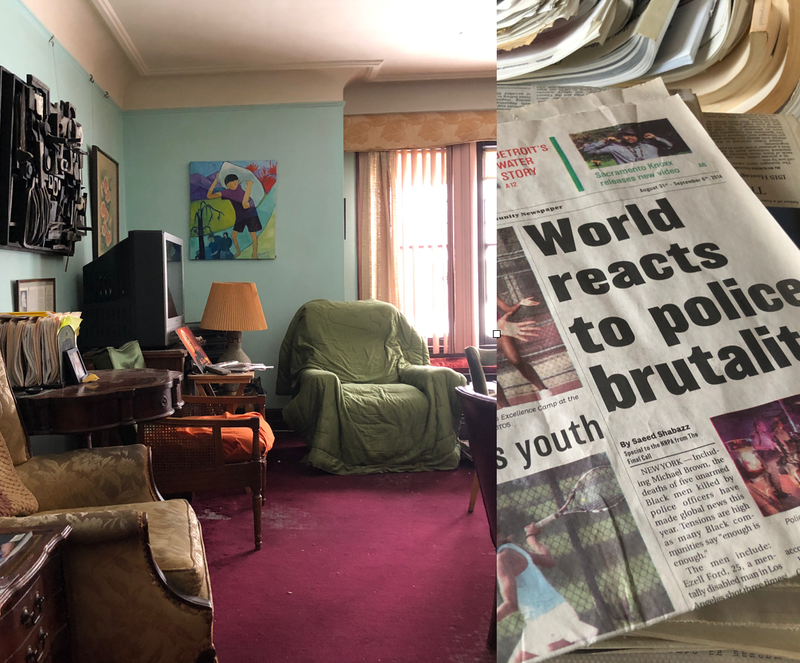 Grace Lee Boggs’ home. Photo ©
Kashira Dowridge
Grace Lee Boggs’ home. Photo ©
Kashira DowridgeThe Boggs’ home continues to serve as an active, vibrant space for community organizing. The main floor remains as it was during Grace’s last days here in 2015 where she lived to be 100 years and 100 days old.
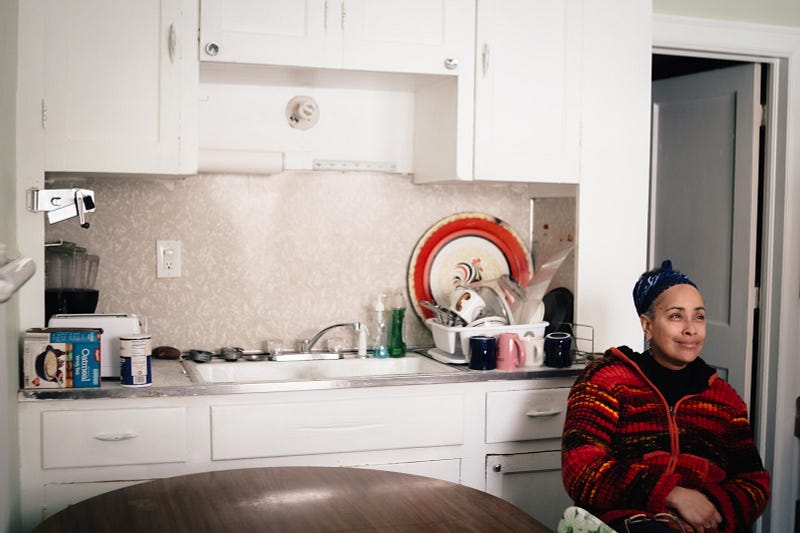 Director Alicia Diaz in the
kitchen at Grace Lee Boggs’ home. Photo © Kashira Dowridge
Director Alicia Diaz in the
kitchen at Grace Lee Boggs’ home. Photo © Kashira DowridgeDirector Alicia Diaz is making a documentary and exhibition called Dangerous Times: Rebellious Responses. The sanctuary movement of the 1980s was a religious and political campaign to provide safe haven for Central American refugees fleeing civil conflict, a move driven by over 500 U.S. congregations across 11 denominations. Dangerous Times traces the movement’s rise in Detroit through the personal accounts of Esther Gálvez, a Latinx sanctuary advocate, and Sihanouk Mariona, whose family was amongst the most visible Salvadorian exiles in the US
“The kitchen is significant because the kitchen is the heartbeat for communities of color,” reflects Diaz. “Yeah, it’s the heartbeat. It’s where all the stories are told. It’s where traditions are passed down. With Esther Gálvez, that’s where she received the knock on the door, to her from becoming ordinary to extraordinary, into the sanctuary movement.”
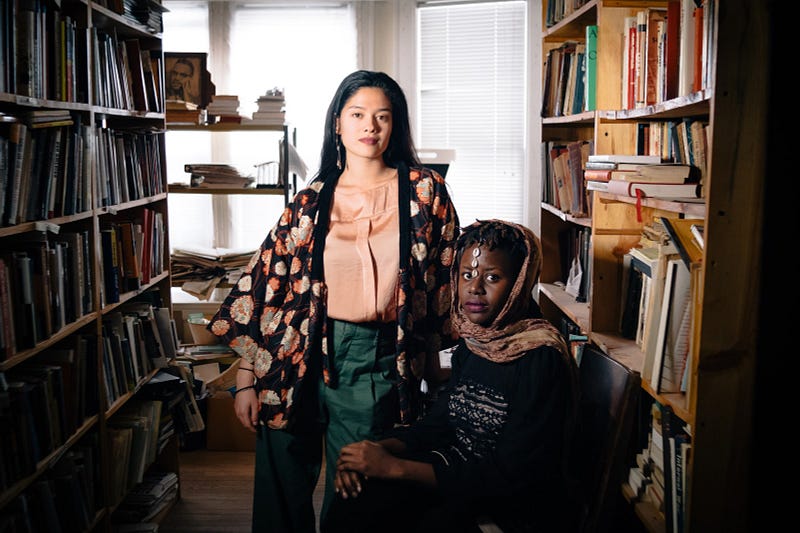 Producer Natasha Tamate Weiss
(left) and Director Atieno Nyar Kasagam (Sidelots) in the library. Photo © Kashira Dowridge
Producer Natasha Tamate Weiss
(left) and Director Atieno Nyar Kasagam (Sidelots) in the library. Photo © Kashira Dowridge
While in the Boggs’ library, the Sidelots team discovered two books of personal significance. Director Atieno Nyar Kasagam found a book “by one of Kenya’s most powerful independence leaders called Mbiyu Koinange, and this man was just like me. He studied in the U.S. and in England at around my age,” she said, “He was no more than ten years older than I am right now when he wrote that book that was published in Detroit. And I was, like, ‘God damn, how did he get to Detroit?’ And not only was he in Detroit but the Boggs had five copies, six copies, of the same book.”
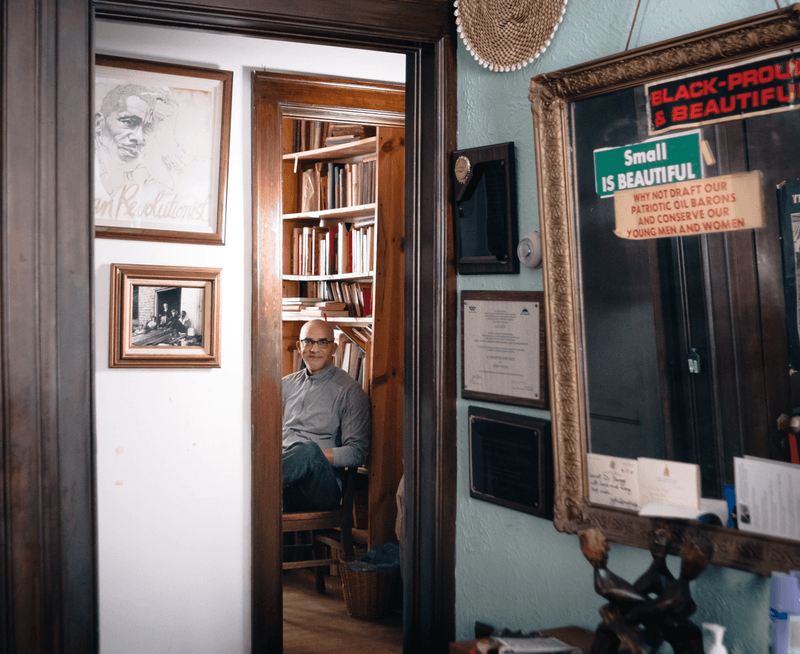 Director Orlando Ford in the
office at Grace Lee Boggs’ home. Photo © Kashira Dowridge
Director Orlando Ford in the
office at Grace Lee Boggs’ home. Photo © Kashira Dowridge“It didn’t hit me until after I got home how profound it was just to be in that space and say ‘Oh, okay, their house is turned into a center for the community as they lived their lives,” says Orlando Ford, who is directing Take Me Home, a documentary on Detroit’s home foreclosure crisis.
See the full photo essay in the Collective Wisdom report.
This article is part of Collective Wisdom, an Immerse series created in collaboration with Co-Creation Studio at MIT Open Documentary Lab. Immerse’s series features excerpts from MIT Open Documentary Lab’s larger field study — Collective Wisdom: Co-Creating Media within Communities, across Disciplines and with Algorithms — as well as bonus interviews and exclusive content.
Immerse is an initiative of the MIT Open DocLab and The Fledgling Fund, and it receives funding from Just Films | Ford Foundation and the MacArthur Foundation. IFP is our fiscal sponsor. Learn more here. We are committed to exploring and showcasing media projects that push the boundaries of media and tackle issues of social justice — and rely on friends like you to sustain ourselves and grow. Join us by making a gift today.